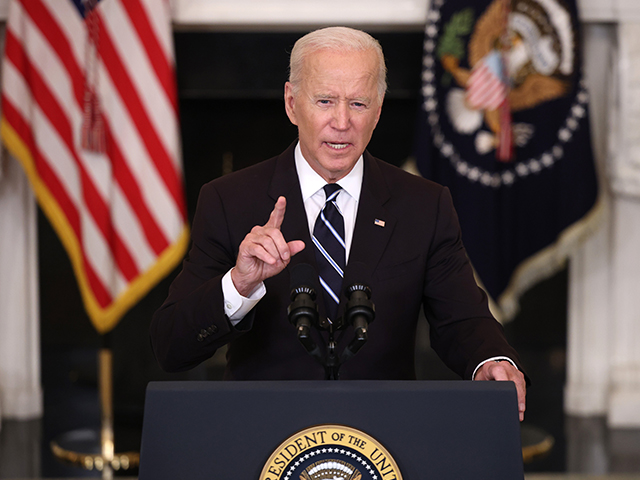Biden’s Economy Is Very Unpopular
You almost have to feel sorry for the folks at the White House in charge of economic policy.
The unemployment rate in March ticked down to 3.5 percent, one of the lowest levels in records stretching back decades. The consumer price index (CPI) rose by just 0.1 percent, with the price of groceries flat compared with February and gasoline prices falling. Yet public approval of the Biden administration’s economic policies remains extremely low, and approval of the Big Guy himself keeps falling.
CNBC’s All-America Economic Survey was released on Tuesday. It showed that Americans are more pessimistic about both current and future economic conditions than they have been at any time in the 17-year history of the survey. Americans disapprove of Biden’s handling of the economy by a 62 percent to 34 percent margin, worse than the miserable 57 percent to 38 percent recorded back in November.
Biden’s overall approval rating is deeply underwater. The share of Americans saying they approve of Biden’s job as president fell two percentage points from the November survey to 39 percent. The share saying they disapprove rose by a point to 55 percent.
Prices Rising Faster Than Wages
Inflation is obviously the biggest problem. Only five percent of respondents to the CNBC survey say their household income is rising faster than consumer prices. Another 26 percent say they are just keeping up with inflation. A stunning 67 percent said they are falling behind because of inflation.
This is not some delusion on the part of American households. Over the past year, the overall consumer price index is up five percent, and food prices are up 8.5 percent. Electricity prices are up 10.2 percent. Prices of new cars are up 6.1 percent. Clothing prices are up 3.3 percent, which seems almost like a bargain in a world where prices of everything else are rising so rapidly. So, even though prices of some items have fallen—like used cars and gasoline—and the annual pace of inflation overall has come down a lot from the extremes of last year, the strain on households remains very real.
Look at a few other measures of inflation. Sticky consumer prices, those that the Department of Labor says tend to change infrequently, are up 6.45 percent. Prior to late last year, you would have to go all the way back to 1982 to find sticky prices rising that much. Median CPI is up 7.1 percent from a year ago, according to the Cleveland Fed. Core CPI, which excludes food and energy, is up 5.6 percent.

The public does not appear to have much confidence in the ability of policymakers to solve this problem quickly. The Summary of Economic Projections from the Federal Reserve’s last meeting showed that the median expectation for inflation over this year ticked up to 3.3 percent from 3.1 percent at the December meeting. Next year, inflation is expected to come down to 2.5 percent. The University of Michigan’s survey of consumer sentiment, however, showed that the public’s expectation for inflation over the next 12 months jumped to 4.6 percent in April from 3.5 percent in March.
Fighting the Last War
Part of the problem is that our politicians and economic policy wonks are still deeply stuck fighting the last war. Many of the Biden administration’s top economic minds still seem to be fixed on the macroeconomic problem of the last Democratic administration: namely, persistently low demand for labor. They conceive of policy proposals in terms of “jobs created,” and tout the strength of the labor market as an economic accomplishment. They have not caught on to the fact that we have been in a low unemployment environment for many years now.

The CNBC poll illustrates how the economic concerns faced by Americans today are very different from those that bedeviled the country in the Obama-era. Sixty-three percent of Americans say they are not worried about losing their jobs, an increase of five points from the survey. Over one-third say they expect wage increases this year. Running a policy playbook based on low demand for labor rings hollow.

President Joe Biden speaks in the State Dining Room of the White House on September 9, 2021, in Washington, DC. (Kevin Dietsch/Getty Images)
According to Jay Campbell, the Democratic pollster attached to the CNBC survey, the silver lining in the most recent numbers is that Biden still has time to build support before the next election. That may be wishful thinking. We’re likely to be in a recession when election season kicks into higher gear next year. That will only make it harder for Biden to convince voters to sign up for another four years of the Big Guy’s economic management.

COMMENTS
Please let us know if you're having issues with commenting.